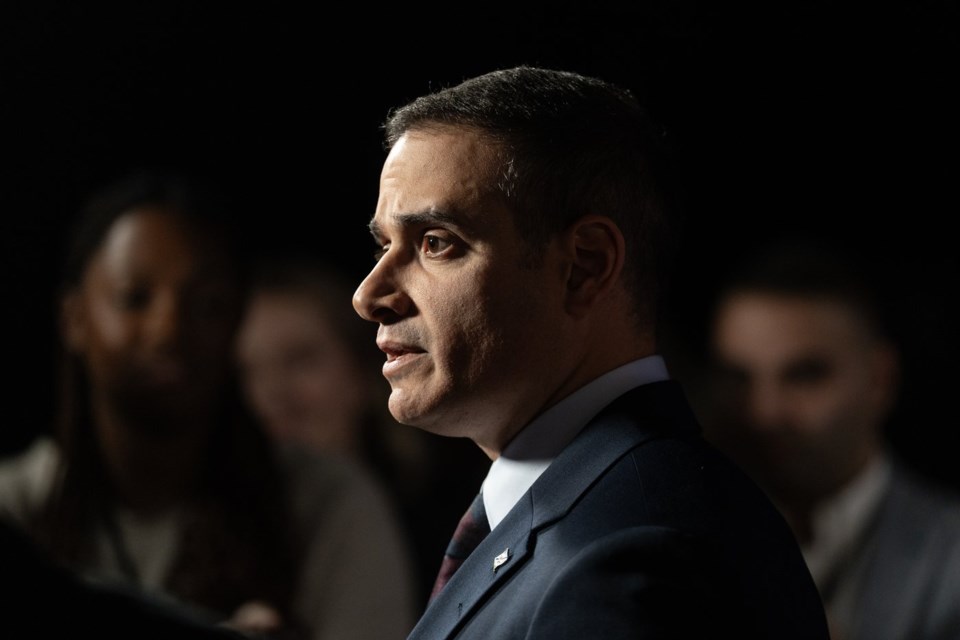HALIFAX — A day after Nova Scotia Premier Tim Houston led the Progressive Conservatives to a massive majority win, the Liberals were licking their wounds and wondering why their party was almost wiped off the political map.
On Wednesday morning, once all the ballots were counted, the incumbent Tories had secured 43 of the 55 seats in the legislature, an increase of nine. The NDP won nine seats, an increase of three, and the Liberals fell to only two seats, a dozen less than when the campaign started. One Independent candidate held her seat — a first for the province.
Liberal Leader Zach Churchill, a 40-year-old former cabinet minister, lost his seat after a long, see-saw battle with his Tory rival in the riding of Yarmouth — Churchill's hometown on Nova Scotia's southwestern shore.
The Liberals had to give up their role as official opposition and the party barely held on to official party status.
"At the end of the day, this falls on my shoulders," Churchill said afterwards. "This loss belongs to me and me alone."
But it would be wrong to blame Churchill for his party's collapse at the polls, says Tom Urbaniak, a political science professor at Cape Breton University in Sydney, N.S.
"Zach Churchill was dealing with a damaged Liberal brand — damaged in large part by the current standing of Prime Minister Justin Trudeau," Urbaniak said in an interview Wednesday, adding that Houston took advantage of that weakness.
"(Churchill) was portrayed as Justin Trudeau's junior protege. And that stuck with some Nova Scotians."
Throughout the campaign, Houston and his Tory colleagues tried to link Trudeau — whose Liberals are trailing the federal Tories by about 20 points in the polls — with Churchill, a well-spoken career politician who was elected to lead the provincial party in July 2022.
"We know Zach Churchill defends his federal cousins at every turn,” provincial Fisheries and Aquaculture Minister Kent Smith said in a statement early in the campaign. “Once again, when Zach Churchill had the choice to stand up for Nova Scotians or stand with Justin Trudeau, he chose Trudeau.”
Churchill was also hobbled by a relatively low provincial profile, Urbaniak said. Despite the fact that he had held the riding of Yarmouth for the past 14 years and served in the cabinet of former Liberal premier Stephen McNeil, Churchill failed to leave much of an impression on the electorate, he said.
Part of the problem was that McNeil, who served as premier from 2013 to 2021, rarely let his ministers spend much time in the limelight.
"Stephen McNeil, at times, ran a one-person government," the professor said. "The premier made the big decisions .... That came back to hurt Zach Churchill."
As well, Houston's decision to call an early election also stung the Liberals and the NDP, both of which were still nominating candidates when the campaign started.
On another front, the Liberals in southwestern Nova Scotia were hurt by the fact that residents in several fishing communities had long complained about what they said was the federal Liberal government's failure to stop the illegal fishing of lobsters and baby eels.
"The perceived federal mismanagement was a factor in some ridings," Urbaniak said, pointing to the Acadian riding of Clare, which had been held by the Liberals for the past 31 years. Liberal candidate Ronnie LeBlanc, a local fisherman, lost the riding to rookie Tory candidate Ryan Robicheau on Tuesday night by more than 1,000 votes.
During the campaign, Churchill promised to establish an inquiry into illegal fishing, but voters on the South Shore were unimpressed. The Tories won all nine ridings in the region.
It was Churchill's first election as leader. On Tuesday night, he declined to say if he would stay in the role.
Neither Churchill nor Houston were available for an interview Wednesday.
As for the NDP, party leader Claudia Chender said she was looking forward to taking on the large Tory majority.
"I think what we take away from being the official Opposition is that people are looking for a strong voice and they are looking for a different voice,” said Chender, a 48-year-old lawyer. It was also her first election as leader.
She said her priorities include pushing for more protection for renters, and reducing the number of people still seeking a doctor.
The three additional seats won by the NDP are all in the Halifax area, part of the party’s traditional power base.
Chender said the election results showed her party has room to grow, particularly along the South Shore and in Cape Breton.
“In many ridings across this province there were tight two- or three-way races and we are building,” she said. “I think that work has started and will continue.”
This report by The 91Ô´´ Press was first published Nov. 27, 2024.
Michael MacDonald, The 91Ô´´ Press



